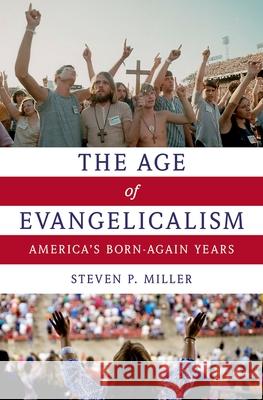Age of Evangelicalism: America's Born-Again Years » książka
Age of Evangelicalism: America's Born-Again Years
ISBN-13: 9780190636692 / Angielski / Miękka / 2016 / 240 str.
At the start of the twenty-first century, America was awash in a sea of evangelical talk. The Purpose Driven Life. Joel Osteen. The Left Behind novels. George W. Bush. Evangelicalism had become so powerful and pervasive that political scientist Alan Wolfe wrote of "a sense in which we are all evangelicals now."
Steven P. Miller offers a dramatically different perspective: the Bush years, he argues, did not mark the pinnacle of evangelical influence, but rather the beginning of its decline. The Age of Evangelicalism chronicles the place and meaning of evangelical Christianity in America since 1970, a period Miller defines as America's "born-again years." This was a time of evangelical scares, born-again spectacles, and battles over faith in the public square. From the Jesus chic of the 1970s to the satanism panic of the 1980s, the culture wars of the 1990s, and the faith-based vogue of the early 2000s, evangelicalism expanded beyond churches and entered the mainstream in ways both subtly and obviously influential.
Born-again Christianity permeated nearly every area of American life. It was broad enough to encompass Hal Lindsey's doomsday prophecies and Marabel Morgan's sex advice, Jerry Falwell and Jimmy Carter. It made an unlikely convert of Bob Dylan and an unlikely president of a divorced Hollywood actor. As Miller shows, evangelicalism influenced not only its devotees but its many detractors: religious conservatives, secular liberals, and just about everyone in between. The Age of Evangelicalism contained multitudes: it was the age of Christian hippies and the "silent majority," of Footloose and The Passion of the Christ, of Tammy Faye Bakker the disgraced televangelist and Tammy Faye Messner the gay icon. Barack Obama was as much a part of it as Billy Graham.
The Age of Evangelicalism tells the captivating story of how born-again Christianity shaped the cultural and political climate in which millions Americans came to terms with their times.











